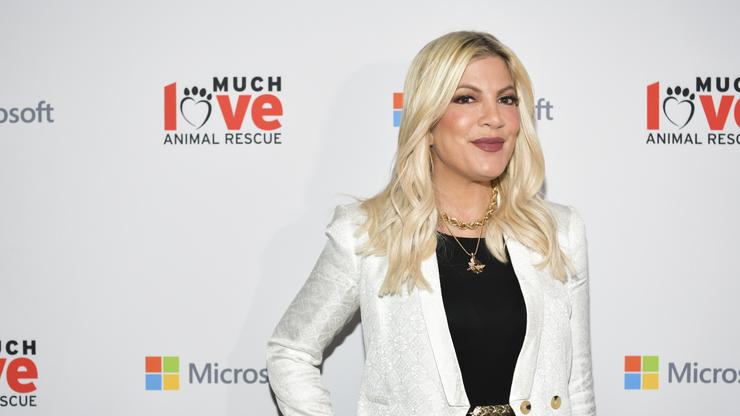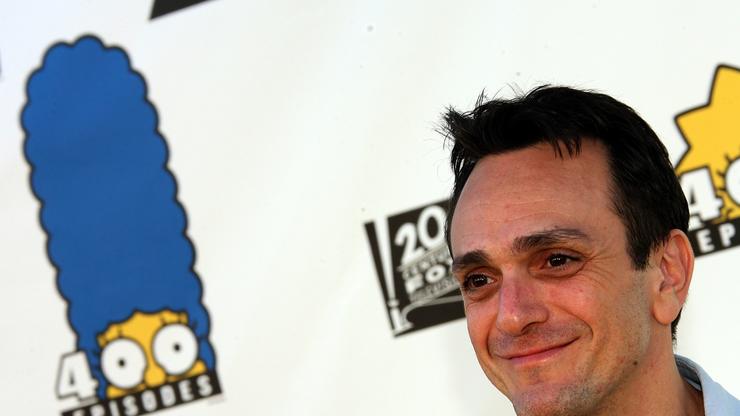Tori Spelling has sparked a ton of outrage after posting a photo of her 8-year-old daughter, Hattie, dressed as "McQuisha," a character many found to be a stereotypical mockery of "ghetto" black women. Like many folks around the world, Tori and her family are practicing social distancing to prevent the further spread of coronavirus, and it looks like she's found some pretty questionable activities for her kids to do to kill time in quarantine. In a since-deleted Instagram story, the actress shared a photo of Hattie wearing a bandana on her head with Cheetos tied around her fingers—meant to emulate fake nails—and explained the character Hattie was pretending to be.
"Days kept inside we have to get creative," Tori wrote in the caption. "Hattie has become McQuisha in her cheeto extension nails." Yikes. The story garnered a ton of backlash, with many calling Tori out for dressing her daughter up as an offensive caricature of "ghetto" black women and encouraging racist stereotypes.
Tori has since apologized for the post, insisting that she didn't intend to do any harm.

"I posted a story the other day that upset many of you," she wrote on her Instagram story. "I'm truly sorry. That was NOT the intention at ALL. Hattie is 8. We watch and adore old reruns of 'Martin.' She loves the character Shanaynay. She made up that name with "Mc" bc her last name is McDermott. She was reenacting the over the top fun and amazing character from 'Martin.' She is innocent and didn't mean anything by it. I should have thought about how it could have been perceived and misconstrued before I posted. I did not. I'm truly sorry." Social isolation is really making everyone lose their sense.
"The Simpsons" Star Hank Azaria Will No Longer Voice Apu Character
It was a mutual decision between the voice actor and the show.
Hank Azaria has officially announced that he will no longer be voicing the character, Apu Nahasapeemapetilon, an Indian Kwik-E-Mart owner on The Simpsons. Hank, who has voiced plenty of characters on the show since it debuted in 1989, revealed in an interview, “I won’t be doing the voice anymore, unless there’s someway to transition it or something. What they’re going to do with the character is their call. It’s up to them and they haven’t sorted it out yet.” However, he notes that the decision was somewhat unanimous. “All we’ve agreed on is I won’t do the voice anymore. We all made the decision together. We all agreed on it. We all feel like it’s the right thing and good about it.”
 Michael Nagle/Getty Images
Michael Nagle/Getty Images
Hank’s decision to no longer voice the controversial character has been a few years in the making now. After comedian Hari Kondabolu released the documentary, The Problem With Apu, in 2017, public outrage over the character’s allegedly racist depiction of Indian people rose immensely. The documentary explored how people of South Asian descent were impacted by having Apu, a character riddled with stereotypes, as their only form of representation on American television. Creator Matt Groenig spoke out about these complaints at the time, saying, “I’m proud of what we do on the show. And I think it’s a time in our culture where people love to pretend they’re offended.” The show went on to address the issue in a 2018 episode, which was met with even more criticism. When Lisa says to her mother, Marge, “something that started decades ago and was applauded and inoffensive is now politically incorrect. What can you do?” the camera pans over to a framed image of Apu on Lisa’s nightstand with the phrase “Don’t Have a Cow” written on top.
 Mike Coppola/Getty Images
Mike Coppola/Getty Images
Hank condemned the way that the show handled the whole ordeal, revealing that “It was a late addition that I saw right around the same time everybody else in America did, so I didn’t know it was going to be in it until I saw it. I think that if anybody came away from that segment thinking that they should lighten up or take a joke better or grow a thicker skin… that’s certainly not the way I feel about.” Instead, he sympathized with those who have been negatively affected by the character. “The idea that anybody, young or old, past or present, was bullied or teased based on the character of Apu, it just really makes me sad. It certainly was not my intention. I wanted to bring joy and laughter to people. And the idea that it’s brought pain and suffering in any way, that it’s used to marginalize people, it’s upsetting, genuinely.” He was even willing to step down from voicing the character back then, as he felt that “the most important thing is to listen to Indian people and their experience with it. I really want to see Indian, South Asian writers in the writers room…including how [Apu] is voiced or not voiced. I’m perfectly willing to step aside. It just feels like the right thing to do to me.”






